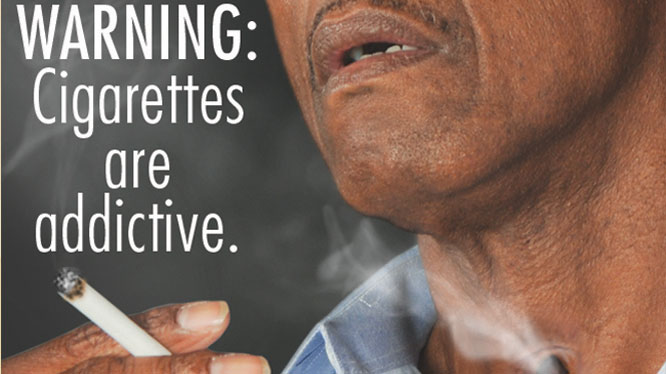Starting in September, smokers will notice a change when they go to light up.
The Food and Drug Administration will require larger, more prominent cigarette health warnings on all packaging and advertisements in the U.S., according to the FDA’s website. These changes in cigarette warnings are the first in 25 years.
The change in the warning label is designed to communicate the harmful effects of cigarette smoking more clearly and effectively, said Delynne Wilcox, assistant director of health, planning and prevention for the University.
“There is an added emphasis stressing the importance of quitting and providing the 1-800-QUIT-NOW on the package,” Wilcox said. “The warning labels inform the public of the health risks involved with cigarette smoking, which is important.”
About 28 percent of college students smoke, she said, and they usually start out as social smokers and then become regular smokers due to the addictive nature of cigarette use.
Tobacco use is linked to 443,000 preventable deaths in the U.S. each year and costs about $200 billion in health care expenses and lost productivity, she said.
Alan Blum, director of the UA Center for the Study of Tobacco and Society, said it doesn’t appear the new labels are going to make a major difference, but no harm will come from them.
This type of warning label was introduced in Canada about 10 years ago and basically had no impact, Blum said. Canada is currently toning down their labels because they don’t want to offend smokers.
“It’s a question of, are you calling the people stupid?” he said. “Are you not really respecting them or insulting their intelligence?”
Max Fazeli, a sophomore majoring in engineering, said he and all other smokers know cigarettes are dangerous.
“You don’t have to put a big label that’s just ridiculous and embarrassing on the pack to tell us something we already know,” Fazeli said. “It won’t work anyway. If I’m going to quit, it’s going to be for personal reasons, not a label on a cigarette pack.”
The United States is no longer the front country for fighting smoking, Blum said.
“For years we were the first country to promote stopping smoking,” he said, “but where many more countries were ahead of us was in promoting the health risks of smoking.”
Blum said the FDA should use other tactics, like taxes, counter-advertising, humor or constant anti-smoking messages, instead of the graphic warning labels.
“The FDA has no sense of humor,” he said. “They take themselves much too seriously, and they don’t know that laughter can be the best medicine.”
The focus needs to shift away from the smoker and to the product, which is consumer fraud because of the filter in most cigarette brands, Blum said. If the FDA wanted an effective warning label, it should say, “the filter is a fraud.” Ninety-five percent of people who smoke buy filtered brands.
Most people think the filter filters out some of the bad things, he said. But, that’s not true because you suck in harder with a filter.
“There is no safe cigarette,” Blum said.
Michael Khalilian, a senior majoring in management information systems, said the new labels will have a very minimal effect, if any at all.
“I think pretty much anything the FDA does is bad,” Khalilian said, “but if they think putting new stickers on cigarettes will deter some people from smoking, then that’s fine with me. Maybe it’ll deter some middle school kids who just want to start smoking to fit in.”
Anna Sharp, a senior majoring in history, said the new labels will make people think more about the harm cigarettes can do, but since they’re addictive, they will not stop most people.
“The labels are somewhat harsh, but students need to see them so the point will get across that cigarettes are dangerous to your health and those around you,” Sharp said.
John Harris, a senior in marketing, said the labels are a great idea since he is not a smoker. However, if he was a long-term smoker, he doesn’t think the labels would persuade him to quit.
“If I was a young person and just experimenting for the first time, and I saw some of those images, I would for sure have second thoughts on going through with it.”







